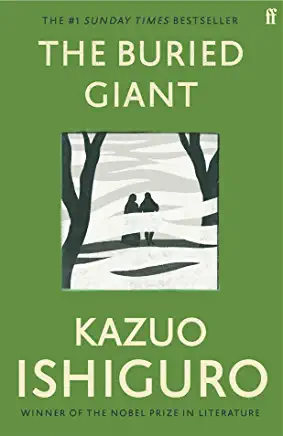Klara And The Sun by Kazuo Ishiguro
Prior to reading Klara and The Sun, I had read two novels by Sir Kazuo Ishiguro, the Anglo-Japanese,
Nobel prize-winning author of novels with such irresistible titles as A Pale
View Of Hills and An Artist Of The Floating World. The first was the
stunning The Remains Of The Day, which I read after seeing the equally excellent
film version starring Antony Hopkins. Much more recently, I read Never Let
Me Go, also made into a very good film (starring Carey Mulligan and Keira
Knightley).
A year or so ago, I
read a fascinating conversation between Ishiguro and his friend Neil Gaiman
about the way fantasy is viewed by the literary establishment, which explored among other things why fantasy is often viewed with such snobbish disdain, as if it should be fenced within a generic compound labelled 'books about wizards and stuff for the feeble-minded'. It has long been a source of bemusement to me that well-read folk of my acquaintance are so condescending about 'fantasy' and so contemptuous of it. After all, these literary types presumably hold A Midsummer Night's Dream or Gulliver's Travels in high esteem. They don't seem to dismiss Austen's novels as simply girlish romantic fantasies, or the Bronte's work as merely the fervid gothic imaginings of three isolated and over-imaginative sisters running about on the North Yorkshire moors (well, yes, in reality, they often do - and in Austen's case it is only her ascerbic wit and ironic tone that helps her rise in their estimation beyond the dual nadirs of 'chick-lit' and 'humour').
In reality, the fantasy genre, just like the sci-fi genre (Ishiguro's latest works straddle the two), is a huge umbrella term for a vast range of writing, much of which is most definitely 'literary'. On one level, every novel ever written is in the genre 'fantasy', but people often hear the word 'fantasy' and immediately think of dungeons and dragons, Tolkeinesque elves and orcs, and children's novels (many of which are among the best books ever written). They associate it with childhood, with cliche, with simplicity, when in fact there are hundreds of fantasy novels that are very far indeed from these things. Critics have apparently felt uneasy by the fantasy elements of Ishiguro's most recent novel, The Buried Giant - Never Let Me Go and Klara And The Sun both fit into the category of fantasy's slightly more respectable cousin, science fiction, so have escaped the worst of this knee-jerk prejudice, but they still have their detractors.
Like several other
‘literary’ novelists such as Margaret Atwood and Kate Atkinson, Ishiguro has
become increasingly interested in fantasy as a genre and his recent novels have
been fantasy/science fiction narratives. There are people who find it difficult
to accept a writer producing work in different genres – like the outrage over
Bob Dylan moving on from acoustic to electric, or the inability to accept
actors associated with one role when they move onto a different one, this
attitude is narrow-minded and silly, though understandable. People like to
categorise others and we don’t accept change easily (at least initially). However, these days it seems to be much
more common and much more acceptable for artists of all kinds to try their hand
at all sorts of things, and experimentation is at the heart of creativity,
whether it is The Beatles experimenting with music from different cultures or Barbara
Hepworth using different media in her sculptures. It is also possible to argue
that Ishiguro’s early work had a distinct fantastical element, and that he uses
his exploration of fantasy and science-fiction to make profound points about
life, just as all his novels do.
Klara and The Sun is
narrated by Klara herself. She is an artificial life form, humanoid, highly
intelligent, and created to be a companion for a child. This decision to write
from the perspective of a non-human being is not new, but it gives the novel’s
narrative style a simplicity which is actually quite refreshing. There is a
clarity and generosity about Klara’s ‘voice’ which both charms and frustrates
the reader. She is an observer who observes the people around her in minute
detail, often with great incisiveness, but she also misunderstands situations
due to lack of information (Ishiguro is a master of the unreliable narrator), and she is a product of her programming. The story concerns her relationship with an
isolated and ill human girl, but to tell any more would give away too much of
the plot – the narrative is actually fairly thin, though beautifully-paced and
satisfying in its own quiet way.
At first, I found the
novel a little flat and slow, but Ishiguro includes enough hints at mysteries
to be resolved to keep the reader’s attention (though readers who like more
conventional, generic sci fi and fantasy might feel a little cheated by the
quietness of the plot). I read this novel back in early January, and it has
proved to be one which lingers in the mind, raising questions about what it is
to be human, about the duality of soul and body, the nature of belief, and the
purpose of existence. It is a poignant novel with a number of similarities to
Ishiguro’s earlier Never Let Me Go, not least the relatively naïve narrator.



I have just finished this. I'm still mulling on it but I do know that I did get slightly irritated by Klara's 'narration' by the end but it is undoubtedly clever and raises many questions.
ReplyDeleteYes, if I am absolutely honest, there was a long stretch where I got a bit bored, though I found the last bit quite effective or at least compelling. It is a novel which I've enjoyed more in retrospect than when I read it. But I do think it raises interesting questions and ideas (though they are ones I've seen raised elsewhere). Let me know what you think after your mulling!
ReplyDeleteWill do.
Delete